By Cristan Williams
Upon completion of this series, this work will be released, in its entirety, as both an audio and ebook.
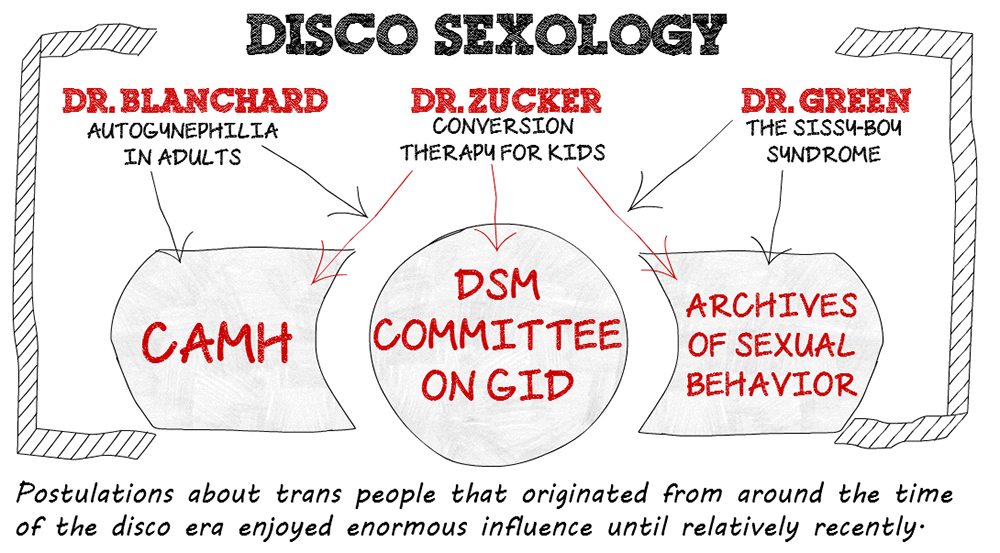

Installment Preface
Welcome to the fifth installment in this series on the rise and fall of Disco Sexology. Affirming therapeutic models offer a patient-therapist relationship wherein the patient’s gender isn’t problematized. This approach was recently criticized in a BBC documentary titled, Transgender Kids: Who Knows Best? wherein Dr. Zucker compared affirming models of care to buying dog food for kids engaging in anthropomorphic schoolyard play:
“It is possible that kids who have a tendency to get obsessed or fixated on something may latch on to gender. Just because kids are saying something doesn’t necessarily mean you accept it, or that it’s true, or that it could be in the best interests of the child.” He later adds: “A four-year-old might say that he’s a dog – do you go out and buy dog food?”
In this article, I interview a long-term recipient of Dr. Zucker’s treatment. In the previous installment, I interviewed the CAMH Medical Director, Dr. McKenzie. A response from McKenzie that I think is important to keep in mind as you read this article is the recognition that prior to the clinic’s post-Zucker restructuring, both clients and CAMH providers said that the clinic was slow in making appropriate referrals for services:
McKenzie: One of the criticisms of the clinic was that sometimes we were slow to refer people to other support such as puberty blockers and other things. And so, some of the clinicians had basically said, “You know, we could have handled referrals faster.” So, when we’re looking at how to move forward, those are things that we really want to look at because they were saying that we were slower than other clinics to make referrals for services and so, moving forward, we want to make sure that we get that right.
Here, it’s important to review what Dr. Zucker asserted to be best practices to investigators and compare these metrics against the reality of clinical practice under Zucker. For instance, on page 12 of the CAMH External Review, Dr. Zucker asserts:
- At age 15 “in adolescence, the most likely outcome is persistence of the [Gender Dysphoria]. 75-80% would continue to have GD. The treatment would be social transition and biomedical treatment.”
- “In response to questions about referral for hormone therapies, Dr. Zucker identified “[Physiologically] at Tanner stage 2, which can occur at a variety of ages. The bottom number is age 11. The Dutch tell us it improves bone density to use masculinising hormones but not facilitate full transition. Persistent gender/body dysphoria at puberty” would determine this referral.”
However, compare the above asserted ethical practices to the reality identified in the CAMH Review:
- “The referral times for adolescents are too long for those of ages 14-16 years. They report that Dr. Zucker and the clinic referrals are ”too conservative” and refer for GnRH [puberty-blocking] hormones later than most other clinicians who refer to them…” – page 16
- “Dr. Zucker has been described as “too conservative” by clinician and patient informants in terms of patient referral times and criteria of diagnosing readiness for referral for gender-affirming hormones.” – page 23
For the following interview, perhaps the most relevant CAMH Review finding comes from page 24:
Chart review and colleague feedback suggested that there are delays to referral for gender-affirming hormones which could, for some clients, lead to irreversible physical consequences of natural puberty that either cannot be altered (e.g., height in an FTM youth or voice pitch in a MTF youth) or only through surgery (e.g, breast development in an FTM youth).
This installment represents the second of five interviews I conducted with individuals intimately knowledgeable about the nuanced differences between Disco Sexology and affirmative care.

A Conversation with Zucker’s Patient, Erika Muse
While reviewing the attention Disco Sexology-supporters generated in Canadian, American, and British web, radio, print, and broadcast media, the most glaring deficiency in the (oftentimes pro-Dr. Zucker) reporting was a lack of representation from the long-term patient. While numerous journalists, bloggers, and social media users were happy to assert their varied opinions about Zucker and his methodologies, the one thing often missing was from these conversations was representation from those who spent numerous years undergoing Zucker’s treatment. What follows is an interview I conducted with a long-term recipient of Zucker’s therapy, Erika Muse.
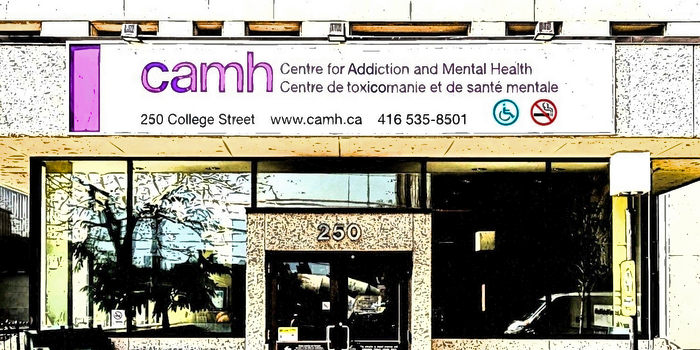
Cristan Williams: Would you please specify the approximate date you first went to CAMH for your intake? Do you remember specifics like, which doctors you saw? Did you only see Dr. Zucker or did you see other professionals as well?
Erika Muse: I don’t recall the specific date, though I think my mother would have that information. This would have been in the middle of the 2000s. I came out in 2004 or 2005. Somewhere in there, I think? I don’t have the exact date, but I do know that I saw Zucker the first time I went to the clinic. I do know that there was another person there who was maybe a psychiatrist. I don’t know her name. She was a woman with blond hair. The only other people I ever saw there was like a nurse or secretary. But that first day, besides Zucker and the psychiatrist, it was just me and my mother.
Williams: I interviewed the CAMH medical director and he was able to talk about his vision for CAMH going forward, so I’m not very familiar with what the CAMH intake process was in the past. Would you please walk me through that?
Muse: Sure. I came out and I spoke to my mother first. She was amazing.
Williams: How old were you at that time?
Muse: I would have been about 15 or 16. I would have been in the 11th grade. So, I came out to my mother and she was fairly accepting. She didn’t really know what [being transgender] was; she was worried for me, but her response was like, “You’re making this out to be a big thing and I’m just glad that you’re okay.”
At the time, I had already been seeing a different therapist and so we went to go see that therapist first and they were like, “Oh, okay. That makes sense. That’s the missing piece of the puzzle of what’s up with you.” She wasn’t really familiar with trans care herself, but she was accepting of me and wanted to help me work through what I needed to.
The reason she wasn’t really familiar with trans stuff is that CAMH was treated as a clearinghouse for anybody with gender issues here in Ontario. My therapist sent me to a local endocrinologist but they said, “No, we won’t treat you without a referral from CAMH.” So, I specifically had to go to CAMH to get care. Because Ontario has a public health system, and because I could not afford private healthcare, I had to go with the public health system. The public health system was set up in such a way that if you wanted trans care, you had to go to CAMH. So, that’s the way the system was set up and that’s why I was sent to him.
When I went to go see Zucker, it wasn’t like I was just going there saying, “Hey, I have gender issues.” I was specifically going there saying, “Hey, I know what’s going on with me and I specifically want hormones and to transition.”
Williams: So, after the referral was made, and CAMH did an intake, and you had your initial visit, would you describe what that experience was like for you?
Muse: That first visit was basically going over my family and personal history. We talked about who my last therapist was and what we talked about. We talked about what was going on with my family. For example, my father died in 2000, so we talked about how that was for the family. The thing that I remember was that Zucker specifically wanted to talk to my mother. She told me that Zucker focused on the death of my father with her and how not having him around might have affected me; you know, lack of a father figure stuff, you know? There were also questions like, “Has your child ever dressed in girl’s clothing” and like, “Does your child like to play with girl’s toys”. My mom was like, “I don’t know. She’s just recently come out to me.”
They had questionnaires they made me fill out, there was a set of extremely private questions about my sexuality and my sexual fantasies. They wanted me to go into as much detail as possible about that.
I remember I asked Zucker where the washroom was and Zucker asked me, “Well, which one do you think you should use?” In this very commanding way, demanding that I give him this important answer, if that makes sense? It was kind of like it was meant to be a test.
The entire intake process was a series of appointments, not just one appointment. I went back two or three times after that and then, after all, that was when I started going to direct therapy sessions with Zucker himself.
Williams: What was your therapy sessions with Dr. Zucker like?
Muse: He started off his sessions very personably. Dr. Zucker, face-to-face he’s a very nice man. He’s warm, he says hello when he sees you, he smiles, he asks nice questions like, “How are you doing?” and “How’s your family?” and he would ask if you’d like tea or coffee. I mean, he would say things that are very nice. He wasn’t… I mean, he wasn’t the kind of person to get angry. He’s very academic. So, he had this personality where he was either kind of warm or he was kind of the absent professor, if that makes sense?
But at the same time, meetings with him were kind of like a sparring match. It’s like I felt like I needed to… I mean, he’d ask these probing questions trying to break down why I was thinking that I was trans. He would keep attacking the idea of me being trans in these different ways; he’d keep trying to break me down, you know? I would come out feeling destroyed or taken down or something.
Anytime I walked out of a meeting with Dr. Zucker, I just felt completely destroyed. I mean, I’ve had great therapeutic sessions [with other therapists] where you walk out of the session feeling like you made a breakthrough. You may not be feeling great, but you feel like you did some work and made some progress.
Williams: So, I guess what I hear you saying is that Zucker’s therapy wasn’t aggressive in that he was belligerent; I hear you saying that he was aggressive in that his therapy was constantly challenging your experience of self. In other words, are you saying that your therapy sessions were situated around you defending, qualifying, and proving your trans experience to his satisfaction?
Muse: Yes. You’ve got it pretty much down to a T. He would chip away at things.
One thing that maybe made it harder for me was that when I came out to my mother, my mother was like, “Well, I don’t really know anything about this trans stuff, but I think we should do some learning.” So, she took me to the university library where she was a student and we checked out a bunch of books on feminism, so between the time I came out and the time I saw Dr. Zucker, I’d given myself a crash course in queer theory and so that made our sessions difficult. He would be like, “Well, you want to be a girl so that means you want to wear dresses, right?” and I’m like, “Well, maybe if I just wanted to, but I don’t need to because that’s not what makes a woman.”
Williams: How long did you receive Dr. Zucker’s brand of gender therapy?
Muse: I saw him for, I would estimate about… I think it would have been about 7 or 8 years.
Williams: Did he at some point approve you for hormones?
Muse: He eventually did. From the beginning, I was clear that I was there to be able to get hormones and surgery; these are my goals, this is what I want to work towards. I mean, on top of that I would bring up specific things about my gender that I wanted to work on, but he’d never interact with that. For example, part of my gender dysphoria manifested in that I couldn’t stand to look at my face; looking in the mirror was just hard for me. But for stuff like that, he just didn’t have any real options for helping me with that. He just said stuff like, “Well, maybe you should try looking at yourself harder or more and see if you can desensitize yourself.” He wasn’t offering concrete options for transition. When it was time for me to go off to university, I asked him how we could start working on me going to school as Erika instead of my deadname and he never responded to that, for example. Instead, during my last session before university came around, he actually suggested, you know, “Well, maybe university will get you out of your shell and you’ll be more active.” He was very focused on that in high school I didn’t do a lot of socialization. I mean, you know, I’m like, “Hey, I’m trans and puberty sucks and maybe I’d be a more active person if I could transition but as it is, I just want to lay in bed and cry all the time.”
Williams: Did he ever talk to you about puberty blockers?
Muse: Nope. He never did.
Williams: [Gasp] Oh… wow.
Muse: I’ll have more to say about that in a minute. The thing was that he was really concentrated on the fact that I wasn’t very social in high school and that I wasn’t sexually active. I got the feeling that he thought that my not being sexually or romantically involved or very social in general was the thing that was causing my gender dysphoria and that fixing that would fix my trans issues.
Williams: So, he was saying that maybe if you date or find a girlfriend or boyfriend then you wouldn’t be trans?
Muse: I won’t say that he ever explicitly said that to me, but that was definitely how it felt. I felt that he thought that there were always these other issues and if these other issues were taken care of, then I wouldn’t be trans. That was his deal; I supposedly had these other issues and if I could fix these other issues in my life fixed then I’d be perfectly fine.
When I went to see him for my last session before university, it was like, “Go off to university, get socially active, do more things, and get out of your shell, and see how that goes and you’ll probably be fixed and I don’t want to see you again.”
So, I went off to university and holy crap did I get socially involved! I joined a bunch of activist groups and ran myself ragged. But, I actually had a good year at university, but dysphoria was still a problem and depression was still a problem. I didn’t finish some of my assignments because I was in be in bed dysphoric and depressed.
So, I went back to [Zucker] again and we basically started off where we were before. I was like, “Okay, I tried these things and the problems I came to you about wasn’t solved.” The way things worked with him is that he was like, “Do this, and this, and then do that.”
Williams: He would set up various hoops that you would jump through and then he would just present yet another hoop?
Muse: Yup. And so, I would go back and see him and I would jump through more hoops and throughout the rest of my time at university, basically what would happen was that I would go and see him and I would feel sufficiently destroyed, dysphoric, and depressed from either one or a handful of sessions and I would just fall into another depressive period.
I would eventually get to the point where I could overcome the depression and want to set my life in order –deal with my gender issues– and then I would go back and see him again and the cycle would start again.
Williams: To be clear: he never mentioned to you or your parents that there’s this thing called puberty blockers?
Muse: No. He never mentioned puberty blockers.
Williams: Good god.
Muse: No. He never did. I mean, when I was going to classes it was as Erika, using female pronouns, and wearing girl’s shirts and pants, but that didn’t seem to count as a “real life test”. I mean, towards the end of the process, as a now 22-year-old, almost 23-year-old adult, he did finally give me a prescription for hormones. He gave me anti-androgens and after I completed what he considered to be a “real life test”… I mean, I came to him and said that “I have a boyfriend now,” and it seemed like after I said that, that somehow changed things for him. Maybe something like I’ve proven that I’m confident enough in my identity that I have a boyfriend, you know?
After I told him that I was in this relationship as Erika and that my partner knew that I was trans, I just remember Zucker hammering on that; he’d go back to it again, and again, and again. He would keep asking, “Are you sure he’s okay with it?” and “Are you sure he doesn’t think that you’re a gay man?”
Williams: Wait… So, now you’re 22, almost 23 years old, you’re finally on androgen blockers, prove to him that you can have a boyfriend, and then he challenges you to prove to him that your boyfriend is your boyfriend in a heterosexual context and not that you are two men in a homosexual relationship? He pushed back against the notion that you’re female and he’s male and that this wasn’t a gay relationship and when you stood your ground, then, at almost 23, he finally prescribed you female hormones?
Muse: Yes. After that, he made sure that I did this real-life trial [sic], and then we had one last session in 2013 and that was when he approved me to start taking estrogen.
Williams: So, to make sure I’m understanding the process you went through, I want to contrast Zucker’s therapy with some contemporary therapeutic approaches of therapists I know. For youth, they do something called “watchful waiting” and they talk with the child about what they’re going through and how they’re doing. They talk about how to manage disapproval from peers and working with feelings in general. They check in with the kids to find out if they’re feeling good or are scared; in short, their therapeutic model is sometimes called an “affirming model” so that by Tanner Stage II of puberty, they are given the option of putting puberty on pause with puberty blockers. That is, not estrogen or testosterone treatment, but medications that can put puberty on pause in a way that puberty can be un-paused later on. They are also supportive of a child’s constantly, insistently, and persistently expressed gender without trying to make them conform to any gender standard.
Now, contrast that with Dr. Zucker’s approach and it seems like Zucker’s approach was that he positioned himself as a hoop master, that his job was to challenge your constantly, insistently, and persistently expressed gender and, in some sense, interrogate that subjective experience of self so that it’s his job to question and challenge any certainty you might have about your gender.
Jesus, I mean, you didn’t even get puberty blockers until you were in your twenties!
Muse: Yup. Yes. You’ve got it correct. Now, about puberty blockers… I need to tell you this. So, he definitely knew I was going through puberty. I know this because every time I would go to his office one of the very first things he would say would be to comment on how my body was changing. Specifically, there was this time where he commented on how my shoulders were getting larger and how I was filling out.
Williams: [Gasp] OH MY GOD!
Muse: He would say it in a way that it was clear that he meant that this was a good thing. I would feel just destroyed in those moments. I mean, this was stuff I was keenly aware of. I mean, I had so much dysphoria I couldn’t hardly deal with it or even look at myself in the mirror and he would comment on it and I was like, “This is what I came to you to stop and you’re talking about it like it’s a good thing.”
[silence]
Williams: Oh my god. [silence] I… That’s… On every level that seems so obtuse and cruel.
Muse: It was. A lot of what he did to me was really cruel.
Williams: I… I… I am just… speechless. That’s just… Oh my god. I mean, what’s left for me to ask you in this interview? What’s left for you to say? That he purposefully imposed a male puberty on you as part of his “therapy” seems horrific! It’s a scar that can never be healed.
Muse: Yeah, during that time I was suicidal. I was so depressed. I got to the point where I was thinking about a plan. I was depressed, suicidal, anxious, where I wouldn’t leave my bed for days, my academic career was negatively impacted to the point where one semester, I just couldn’t go to class.
I mean, I’m slowly getting better, but I still have significant issues with dysphoria and the trauma of what happened to me. I mean, I feel like my life was ruined by him. I feel like he took what could have been a great decade of life for me and turned it into a decade of depression and dysphoria. He took that from me. I mean, I feel like he destroyed me as a person. In some fundamental way, it’s hard for me to think of myself in a positive light at all. I mean, I’m slowly trying to rebuild it, but it’s a horrifyingly raw and long process.
Williams: Have you been able to work with a therapist that’s different than Zucker? I mean, have you been able to work with an affirming therapist?
Muse: Yes. I’ve worked with other therapists who are supportive. I recognize that therapy and mental health care is a very good and helpful thing in general. It’s just that Zucker wasn’t an example of that.
Williams: Erika… I am just so, so sorry all of that happened to you…
Muse: Thank you. ⬛

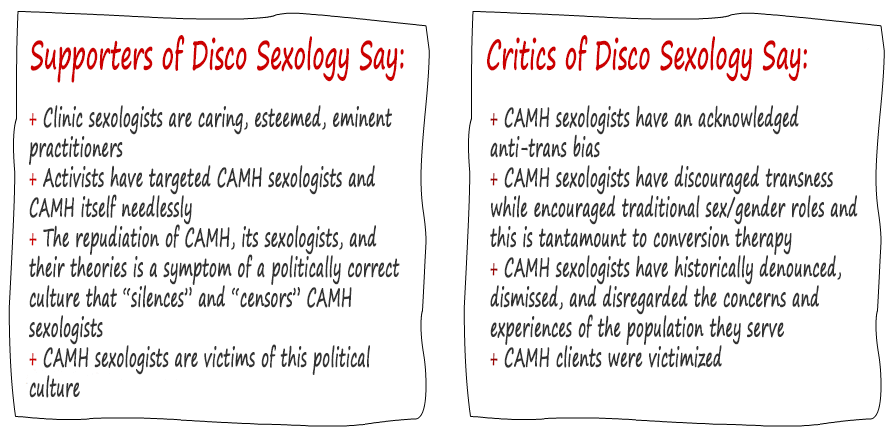
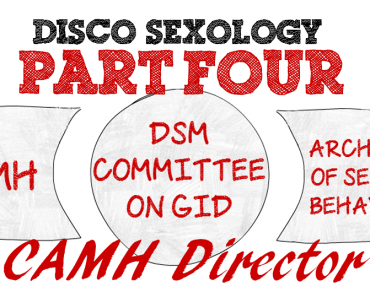
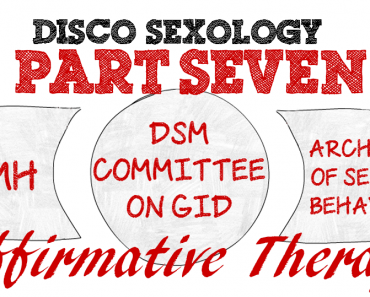
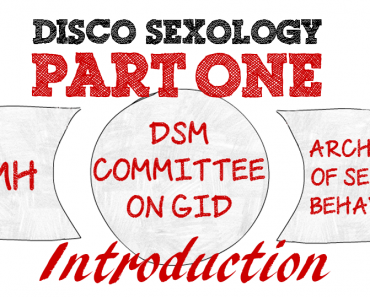
thank you for sharing this. i meet erika a few years ago. she answered for me many questions. sadly i meet zucker when i was 14 , he and his people decided i need to be cured. He was wrong i, struggled for so many years i am better now . i started to be me 5 years ago and with help from my therapist i am living my life. I hope the best for Erika in the future. zucker is a fraud he should never been allowed near children.
amanda
Jeees… I’m so upset after reading this. I really want to reach out to Muse – but offer what? As she said, all those lost years, years of miserable torture. I was angry when I watched the BBC video and as you’ve unpeeled the layers of betrayal at the heart of CAMH, I feel angrier still. Bless you for your hard work x
Dear Cristan
thanks for your tireless advocacy